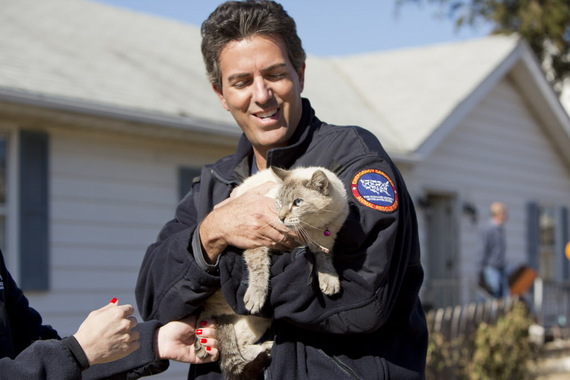Sea World will no longer breed killer whales; Armani discontinued its use of fur; Petco and PetSmart offer shelter dogs and no longer support puppy mills; Ringling Brothers has ended their use of elephants.
The world is becoming a better place for animals thanks to the work of The Humane Society of the United States and its CEO, Wayne Pacelle.
Lisa J. Godfrey for The HSUS
Pacelle's new book, "The Humane Economy: How Innovators and Enlightened Consumers are Transforming the Lives of Animals," is a detailed account of the success of the animal protection movement worldwide. As technology transforms our world it has also provided alternatives for everything from animal testing by cosmetics companies to the use of animals in films.
Perhaps even more important high tech is enabling us to create products such as a plant-based egg substitute. Soon even our meat will be manufactured in laboratories. Factory farms will become obsolete as consumers demand more humane environments for chickens and pigs and companies like Whole Foods, Chipotle and Walmart embrace animal welfare standards.
What is our moral responsibility to animals? Many of us unwittingly support animal cruelty. We buy parkas or gloves trimmed with rabbit fur. We eat meat from factory farms. Our household cleaning products are tested on animals. Wayne maintains that consumers can give products value or make them worthless in the marketplace. It is all a matter of education. Once consumers learn about animal cruelty, they rail against it.
A good example of this is the movie "Blackfish," which highlights the life of Tilikum, a killer whale at SeaWorld who killed several people and is still there today. The documentary aired numerous times on CNN, where viewers heard the inside story from former SeaWorld animal trainers about how these orcas suffered in captivity.
The backdraft was attendance dropped at SeaWorld and the stock price plummeted. Clearly, the business model of breeding whales to perform silly tricks for SeaWorld was suffering. Wayne was instrumental in getting SeaWorld to end its captive orca breeding program marking the beginning of the end of orcas at SeaWorld. While this happened after his book was completed, it is yet another example of how effective he is at swaying public opinion about the way animals are treated. He is as comfortable in the boardroom as he is in the barnyard.
Even in places as far away as Kenya realize that protecting animals is good for the economy. Wildlife tourism is second only to agriculture as one of Kenya's largest industries. When the tribes there saw that elephants translate into tourism and dollars for their communities then they work to protect elephants.
When Walter Palmer an American dentist and his guides lured a lion named Cecil from the Hwange National Park in Zimbabwe by tying a dead elephant carcass to a truck and then killed him there was an international outcry. Palmer hadn't killed just any lion. Cecil was part of an Oxford University research project as well as being a prime attraction for visitors. His death shed light on the despicable practice of trophy hunting. Palmer paid $50,000 to his guides to led him to Cecil so he could add a lion's head to those of other wildlife he had killed over the years. The Zimbabwe Conservation task force found that trophy hunting generated just 0.2 percent of the nation's GDP while nature-based tourism generated 6.4 percent.
Wayne succeeded in getting 45 airlines to pledge that they would not transport lions and other animals killed by trophy hunters. But more remains to be done. We can't ask poor Africans to stop killing elephants for their ivory while rich Americans are killing them for their heads.
One of the best ways to protect animals is through policy change. Wayne has passionately advocated to elected officials that their constituents want to end puppy mills and the use of chimpanzees in experimentation, increase penalties for cruelty to animals, and the protection of wolves and other endangered species. He has gotten countless laws passed that address these issues and more.
Wayne maintains that every business grounded on animal exploitation is ripe for disruption. He notes: "As the humane economy asserts its own power, its own logic, and its essential decency, an older order is passing away, and the near-universal reaction to each new step will be 'good riddance."
"The Humane Economy: How Innovators and Enlightened Consumers are Transforming the Lives of Animals" is an important book. I would urge you to purchase it and learn for yourself how the welfare of animals is changing the world.

